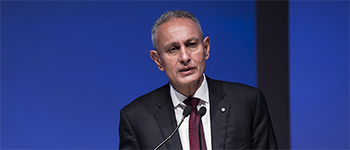
Landmark scientific report on Mediterranean climate is clear: urgent action is needed
News that the Mediterranean region is warming 20% faster than the global average, as confirmed by the first-ever scientific assessment report on climate change to focus on the area, should make us all stand up and act. That is why the Union for the Mediterranean is calling for a concerted regional response to this crucial regional problem.
Opinion Article. Renowned for its cultural and natural wealth, the Mediterranean basin has resiliently proven the cradle of exceptional diversity through the ages. Estimates today indicate the region hosts up to 18% of all identified marine species in the world. Left to its own devices, the Mediterranean clearly has a natural capacity to cultivate life. But this longstanding tenacity for sustaining itself has its limits. Human action is already pushing them over the edge. The concentration of economic activities and its reliance on climate-sensitive agriculture combine to make the region one of the main climate change hotspots worldwide.
For the last few decades, the average annual temperatures of both the sea and atmosphere have increased, sea-levels have risen and these rises are forecast to accelerate. All this while water acidification worsens. Moreover, no less than 15 mega cities border the Mediterranean’s shores and are at risk from flooding making it particularly susceptible to these predicted rises in the future. By 2050, 250 million people are expected to be “water-poor”. An unmanageable number of citizens to provide relief for through emergency measures. All these changes jeopardise both ecosystems and human wellbeing alike.
A wealth of scientific literature exists on the Mediterranean. Detailed risk assessments and data can be found, but resources are unevenly distributed and some of the most vulnerable regions and precarious economic sectors have so far been insufficiently studied. Public and private decision-makers have inadequate access to trusted and up-to-date research. Most notably, these studies are generally focused on the North, meaning the hotter and drier South struggles to make soundly informed and regionally coordinated decisions when it comes to climate change. There has been for some time now, an urgent need to collate the most advanced scientific knowledge about the environment in the Mediterranean basin and to make it readily accessible to policymakers, experts and citizens.
Very aware of this acute need, the UfM Secretariat started in 2015 to closely support and collaborate with MedECC, a network of 600 scientists from all 35 countries of the Mediterranean region. By joining forces, we have built a scientifically robust assessment of climate and environmental change and its impacts in the Mediterranean basin. The end result of this collective endeavour has been the development of the first-ever regional policy interface on climate and environmental change. Today, the scientists behind the report are presenting first-hand its principal findings in Barcelona.
To manage future risks, building resilience by exploiting the data analysed in the report will be key. Only then can we hope to tackle the main issues linked with ongoing changes in a robust and resolute way. We must in fact turn climate change into an opportunity for peaceful, fair and sustainable co-development. One message, beyond immediate scientific findings, emerges from the report: no person, organisation or area, be it the South or North rim of the Mediterranean can face the amplitude of challenges on their own. We all need each other to face this climate emergency. Working together could lead to a new cycle of common growth that is more enhanced and more equal, including in gender relations. Reconsidering in terms of justice and human rights our approach to resources must be at the heart of this process because undeniably, there are huge imbalances within the region, from access to resources, conflicts and continued large-scale migration. If we don’t act now, global warming will take an irreversible toll on the Mediterranean and its inhabitants. The UfM will therefore continue to drive the very necessary conversations aimed at preparing the region to face, tackle and even reverse the inevitable impacts of climate and environmental change.
Settling for the status quo is not an option. We must be bold in our conviction to act together, if not, the consequences will be dramatic and very possibly, irreversible. Citizens are asking for those in power to do more, the next generation demands it. Let’s not disappoint them.

Nasser Kamel
Secretary General of the Union for the Mediterranean.
